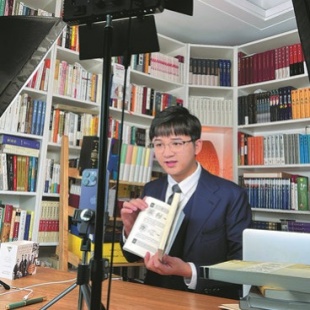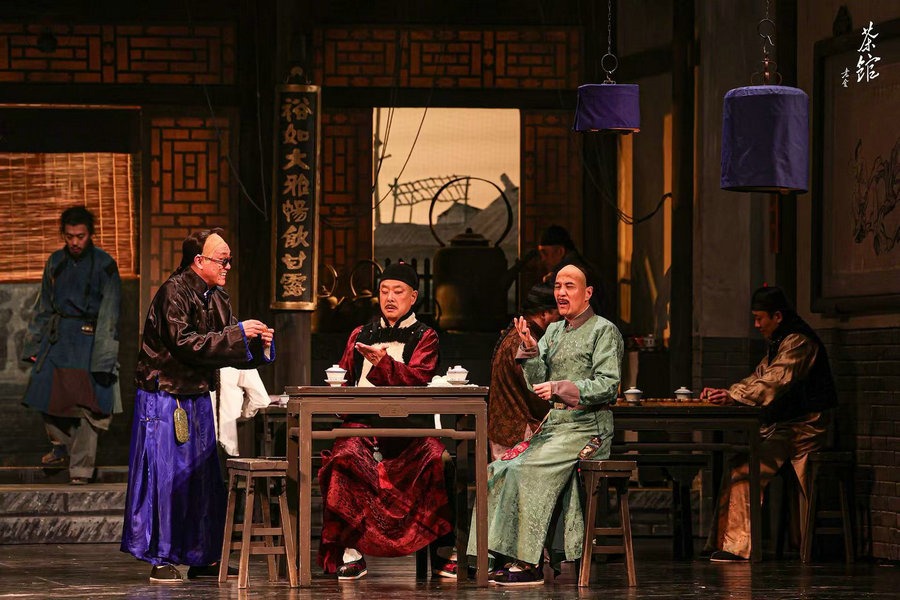Audio 'trailer' gives readers a new chapter in books to enjoy


Every weekend, Zhao Jian meticulously arranges his phone and adjusts the room lighting before he begins to passionately read from books in front of the camera, and when emotions run deep, he even recites verses of poetry.
This is all part of Zhao's routine as an online storyteller living in Nanjing, capital of Jiangsu province. He has nearly 1.4 million followers on Douyin, the Chinese version of Tik-Tok, and his videos have received almost 18 million likes.
"The joy of my work lies in nurturing a love for reading among more people," Zhao says, adding that he sees his role as a bridge connecting listeners with authors through his narratives.
"It's sort of like doing trailers, to spark people's interest in buying tickets to watch movies," he adds.
From Zhao's perspective, a burgeoning cohort of young people is now drawn to books through short videos. "Through artificial intelligence algorithms, books are recommended to targeted listeners who might have an interest, thereby boosting sales of numerous classic books, including many audiobooks."
Data from Douyin's e-commerce platform show that in the first quarter of this year, views of book livestreams surpassed 3.9 billion, generating average daily sales of over 2 million books.
Listening gets trendy
Feng Xiaohui, a manager at the Beijing OpenBook Co, says that new technologies have fostered a change in the way many Chinese read.
"We can see that the mode of reading is more and more diversified, with the popularity of e-books and audiobooks increasingly on the rise," Feng says.
"Nowadays, it's about catering to both the visual and auditory needs of the learners," echoes Zhao Chen, director of digital publishing department at the People's Literature Publishing House, saying that audio elements are increasingly included in the publishing of new books, with many featuring QR codes for audiobook enthusiasts.
Thanks to the fast pace of urban life and the proliferation of diverse media platforms, the reading habits of many people are transitioning from reading to listening, turning audiobooks into a social trend. Statistics show that the user base for audiobooks in China reached 420 million in 2022.
"Amid all the work and family pressures, it's not easy to find a dedicated time and place to read. So, audiobooks are a great choice for me to enrich my fragmented leisure time, allowing me some inner peace just through my phone," says Wang Chun, an IT worker in Suzhou, a city in Jiangsu.
Due to the companionable nature and adaptability of audio recordings, people can enjoy audiobooks while driving, studying, exercising, or doing household chores, making fragmented time more meaningful.
Liu Fang, a visually impaired teacher from Guiyang, capital of Guizhou province, devotes her spare time to making audiobooks on short video platforms, kindling the hearts of numerous readers, including those who are visually impaired.
"Sharing beautiful stories brings me great happiness. Through producing audiobooks, I meet the needs of more young people while offering reading services to the visually impaired and elderly," Liu says.
Traditional libraries are also undergoing digital transformation. The provincial library of Guizhou has established a facility that houses 550,000 titles and more than 100,000 hours of listening resources spanning classics, philosophy, history and children's literature.
"It is very popular, especially among the elderly. They put on headphones, select their favorite books, and relish listening in quiet, gaining knowledge while immersed in a different reading ambience," says Luo Jing, a librarian at the facility.
According to Zhao Chen, audiobooks adapted from online literature are highly story-driven while also captivating to young people. "But when it comes to audiobooks of classics, it is advised that the original work be kept intact to preserve the beauty of the language."
AI amplifies engagement
With the advent of 5G and AI, text-to-speech technology has been widely used in audiobook production. AI-generated audible novels are emerging in Chinese audio-based media and reading applications.
"TTS technology significantly enhances our efficiency in audiobook content production. Current AI-generated content is almost indistinguishable from human voices," says Lu Heng, head of the AI voice laboratory at Ximalaya, China's online audio-sharing platform, which boasted an average monthly active user base of 303 million last year.
With the help of AI, the company has expedited the entire audiobook production process more than 50-fold compared to working manually.
Book listeners can now not only acquire information and knowledge but also immerse themselves in emotional genres such as suspense, humor, and sadness, augmenting their reading experiences.
At a recent exhibition in Italy, Ximalaya unveiled its latest product tailored for children, which enables parents to record their voices for a vast story library, allowing children to listen to their parents narrate stories at any time, with just five one-minute recordings.
Lu says that Ximalaya's voice generation model can swiftly replicate voices with 90 percent similarity within five seconds and generate customized audio within 10 seconds.
After gaining copyright, some domestic audiobook platforms replicate the voices of celebrities using AI anchors, enriching the expressiveness and appeal of storylines.
Douyin's novel reading platform boasts AI voices in over 40 styles, catering to various age groups. These AI voices can eloquently convey profound human emotions and each voice can be seamlessly switched to provide varied storytelling experiences.
Chinese content creators are also harnessing AI technology to produce radio dramas that combine human voices, music and sound effects. For instance, the radio-drama adaptation of the Chinese science fiction novel The Three-Body Problem on Ximalaya has accumulated over 750 million clicks.
"We believe that AI technology catalyzes the industry's growth by enhancing content production efficiency, reducing production costs, and providing users with better listening experiences," Lu says.
According to Liu Xiaochun, an associate professor at the University of Chinese Academy of Social Sciences, AI's technological prowess has injected vitality into the growth of book sales and the popularization of reading among the masses.
She says that AI is lowering the barriers to reading and enabling more obscure books to reach interested readers.
"Technological advancements in livestreaming, short videos, and podcasts can help precisely match users' listening preferences and create personalized experiences," Liu Xiaochun adds.
Zhang Qinghua, a professor at Beijing Normal University, has been impressed with the transformative impact of AI on people's reading habits.
"The prospects of AI in reading are promising, but there are also concerns. Hopefully, AI can embody the human spirit, inspiring more young people to engage with classic literature," he says.





































